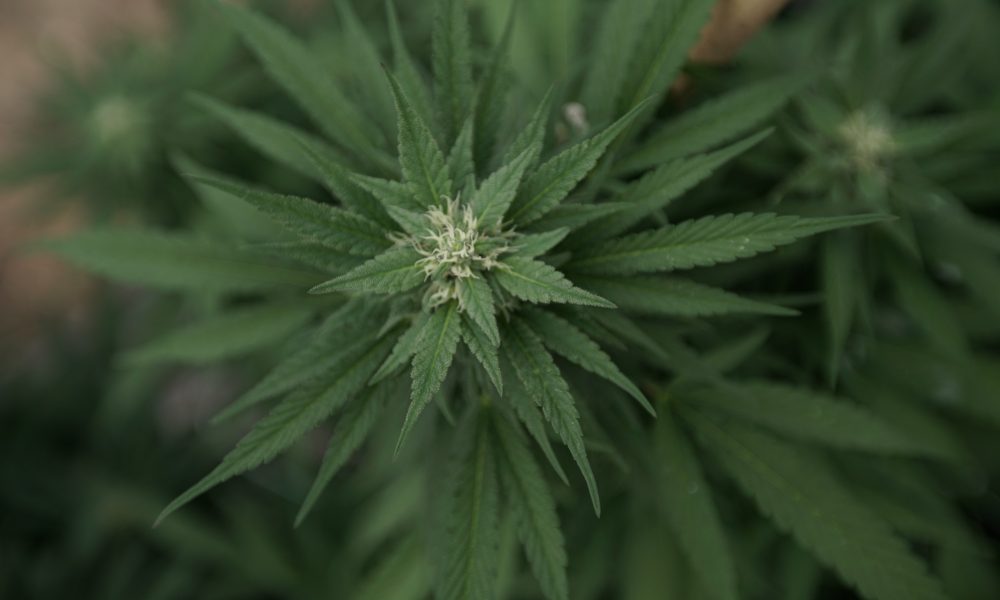The nation’s largest union representing federal employees recently adopted a resolution in support of marijuana legalization and calling for an end to policies that penalize federal workers who use cannabis responsibly while they’re off the clock in states where it is legal.
The American Federation of Government Employees (AFGE), which represents more than 700,000 federal workers across the country, approved the resolution during its 42nd National Convention in June.
The union posted the title of the measure—”Resolution to Support Deleting Responsible Off-Duty Marijuana Usage from Suitability Criteria”—but has not yet publicly released the final text.
A draft version of the resolution that was obtained by Marijuana Moment also expresses support for federal cannabis legalization legislation, the Marijuana Opportunity, Reinvestment and Expungement (MORE) Act, that’s passed the House two times.
The draft resolution says there’s “increasing acceptance of marijuana use in American society, including for medical treatment for veterans of the armed forces and others,” and that’s reflected in the growing number of states that have opted to legalize cannabis in some form.
It also says that “federal regulations unreasonably cast marijuana usage as a matter of concern for security reasons.”
Therefore, AFGE members voted to adopt the measure to join other unions in supporting federal legalization legislation and urging the U.S. Office of Personnel Management (OPM) to “rescind its policies regarding pre-employment use and off-duty use of cannabis by federal employees in non- safety-sensitive, non-national security positions to the extent such cannabis use is permitted by state or District of Columbia law.”
“Specifically, AFGE does publicly support that OPM, in consultation with the President, delete responsible off-duty, cannabis use, where legal at the state level or in the District of Columbia, from its suitability criteria, 5 CFR § 731.202, and delete the cannabis-related questions from the SF85, SF8SP, SF86, and e-QIP,” the draft document states, referring to various forms that applicants for certain federal government jobs need to fill out.
Marijuana Moment has sent multiple requests to AFGE for the final text or comment on the resolution, but representatives have only replied to say that the association’s policy forbids sharing internal resolution documents with media, even though it has made the text of previously adopted resolutions public.
While the draft resolution only talks about the MORE Act, a separate legalization bill filed by Senate Majority Leader Chuck Schumer (D-NY) last month contains a provision that would specifically prohibit federal employers from testing workers for cannabis, with certain exceptions for sensitive positions such as law enforcement and those involving national security.
Meanwhile, House Appropriations Committee leadership recently urged the White House to “continue to review policies and guidelines regarding hiring and firing of individuals who use marijuana in states where that individual’s private use of marijuana is not prohibited under the law of the State” as part of a Financial Services and General Government (FSGG) spending report.
It specifically requests that the executive branch apply drug testing standards with “consistency and fairness.”
—
Marijuana Moment is tracking more than 1,500 cannabis, psychedelics and drug policy bills in state legislatures and Congress this year. Patreon supporters pledging at least $25/month get access to our interactive maps, charts and hearing calendar so they don’t miss any developments.![]()
Learn more about our marijuana bill tracker and become a supporter on Patreon to get access.
—
In June, the Senate Intelligence Committee separately adopted an amendment from Sen. Ron Wyden (D-OR) that would prohibit the federal government from denying people the security clearances they need to work at intelligence agencies simply because they’ve used marijuana.
But in general, federal agencies have been reluctant to loosen cannabis-related employment rules despite state efforts to legalize cannabis for medical and recreational use.
For example, the Substance Abuse and Mental Health Services Administration (SAMHSA) recently proposed a changes to drug testing policies for federal workers that would clarify that having a doctor’s recommendation for medical marijuana or any other Schedule I drug is not a valid excuse for a positive drug test.
Meanwhile, the director of national intelligence (DNI) said late last year that federal employers shouldn’t outright reject security clearance applicants over past use and should use discretion when it comes to those with cannabis investments in their stock portfolios.
FBI updated its hiring policies last year to make it so candidates are only automatically disqualified from joining the agency if they admit to having used marijuana within one year of applying. Previously, prospective employees of the agency could not have used cannabis within the past three years.
The Department of Transportation (DOT) also took a different approach to its cannabis policy in 2020, stating in a notice that it would not be testing drivers for CBD. However, DOT recently reiterated that the workforce it regulates is prohibited from using marijuana and will continue to be tested for THC, regardless of state cannabis policy.
U.S. Rep Earl Blumenauer (D-OR) sent a letter to the head of DOT in May, stating that the agency’s policies on drug testing truckers and other commercial drivers for marijuana are unnecessarily costing people their jobs and contributing to supply chain issues.
The Environment Protection Agency (EPA) also emphasized to its workers that they are prohibited from using marijuana—or directly investing in the industry—no matter the state law or changes in “social norms” around cannabis.
And while the Biden administration has instituted a policy of granting waivers to certain workers who admit to prior cannabis use, it’s come under fire from advocates following reports that it fired or otherwise punished dozens of staffers who were honest about their history with marijuana.
Then-White House Press Secretary Jen Psaki attempted to minimize the fallout, without much success, and her office released a statement last year stipulating that nobody was fired for “marijuana usage from years ago,” nor has anyone been terminated “due to casual or infrequent use during the prior 12 months.”
At the state level, Colorado Gov. Jared Polis (D) recently signed an executive order to provide broad professional licensing protections for workers who use marijuana in compliance with state law. The move also prevents state agencies from assisting in any out-of-state investigations related to lawful cannabis conduct that could result in employment penalties.
Also, a union representing firefighters has claimed credit for a New York City legal directive ordering government agencies, including the New York City Fire Department (NYFD) and New York Police Department (NYPD), to cease drug testing workers for marijuana since the state enacted legalization.
Last year, the state Department of Labor separately announced in guidance that New York employers are no longer allowed to drug test most workers for marijuana, with limited exceptions. Even prior to the enactment of legalization, New York City officials had established a local ban on pre-employment drug testing for cannabis.
Washington, D.C. Mayor Muriel Bowser (D) signed a bill last month that prohibits most workplaces from firing or otherwise punishing employees for off-duty marijuana use.
In Missouri, the St. Louis County Council approved a bill in March to ban pre-employment and random drug testing for cannabis for most county workers.
Read the text of the draft AFGE cannabis workplace testing resolution below:
USAGE FROM SUITABILITY CRITERIA
RESOLUTION # 4003
Submitted by District 14
Whereas, there is increasing acceptance of marijuana use in American society, including for medical treatment for veterans of the armed forces and others, and
Whereas, many States and the District of Columbia have legalized the use of marijuana and related cannabis products, for either medical or recreational use, and
Whereas, AFGE has a history of challenging unreasonable policies around marijuana use, and the AFL-CIO and other unions support the Marijuana Opportunity Reinvestment and Expungement (MORE) Act, and other legislation to decriminalize or legalize the use of marijuana, and
Whereas, the District of Columbia has successfully implemented a program to allow for responsible use of marijuana products by public employees of the District, and for applicants for employment, focused on exceptions for public safety, high-level security and work with children, and
Whereas, federal regulations unreasonably cast marijuana usage as a matter of concern for security reasons, and
Whereas, the enforcement of existing policies appear highly susceptible to selective application by management to remove disfavored employees where good cause to terminate does not otherwise exist, with definite patterns of racial and ethnic disparity,
Therefore be it resolved, that the American Federation of Government Employees, AFL-CIO will promote and support the Marijuana Opportunity Reinvestment and Expungement (MORE) Act;
Therefore be it further resolved, that the American Federation of Government Employees, AFL-CIO does advocate that the Office of Personnel Management (OPM) rescind its policies regarding pre-employment use and off-duty use of cannabis by federal employees in non- safety-sensitive, non-national-security positions to the extent such cannabis use is permitted by state or District of Columbia law. Specifically, AFGE does publicly support that OPM, in consultation with the President, delete responsible off-duty, cannabis use, where legal at the state level or in the District of Columbia, from its suitability criteria, 5 CFR § 731.202, and delete the cannabis-related questions from the SF85, SF8SP, SF86, and e-QIP. (This would also require a conforming amendment to Executive Order 12564, “Drug-free Federal workplace.”)
Photo courtesy of Chris Wallis/Side Pocket Images.
Medical Disclaimer:
The information provided in these blog posts is intended for general informational and educational purposes only. It is not a substitute for professional medical advice, diagnosis, or treatment. Always seek the advice of your physician or other qualified healthcare provider with any questions you may have regarding a medical condition. The use of any information provided in these blog posts is solely at your own risk. The authors and the website do not recommend or endorse any specific products, treatments, or procedures mentioned. Reliance on any information in these blog posts is solely at your own discretion.







